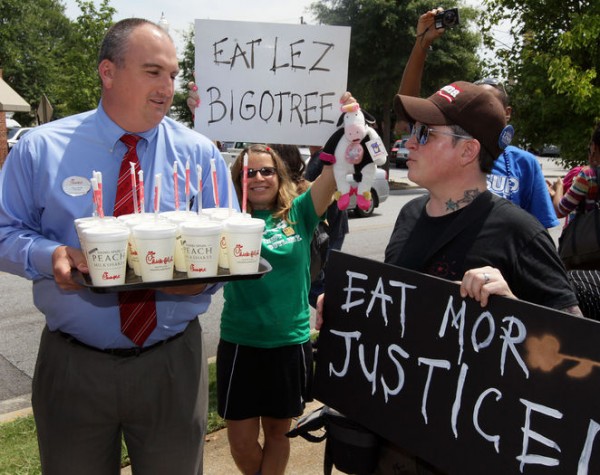LGBT Community Puts Economic Pressure on Political Opponents


Social justice has been a perennial topic of discussion in the United States from the progressive reforms of the Gilded Age to the Civil Rights movement of the 1960s. Today, the Lesbian, Gay, Bisexual, and Transgender (LGBT) community has defined the social justice dialogue that reaches the popular airwaves.
From the passage of Proposition 8 in California in 2008 to the legalization of same-sex marriage in New York in June of 2011, the social dialogue of gay marriage and LGBT rights has spread to both coasts and all areas of public debate from popular referendum to high circuit court battles.
In the last month political rhetoric has taken off on the subject from all corners of the political spectrum, and yet the political situation seems to be moving at the same sluggish pace. The political climate has not changed, but the economics of LGBT rights has finally made it to the forefront of conversation causing a new wave of action from the community.
Through all the political dialogue it is hard to see which side of the polarized debate has pulled ahead over the years. For the LGBT community there has been a politically galvanizing movement to mark a critical shift, as the million man march did. Pride days across the country have allowed for a social cohesion among the community, but with no specific political demands they have not lead directly to national legislation.
As it stands only six states in the country allow same-sex marriages (CT, IA, MA, NH, NY, and VT) with MD, NJ, and WA passing legislation this year in favor of same-sex marriage that has not yet taken effect. Almost half the states in the union do not recognize same-sex marriages and in 2010 the federal government refused to recognize same-sex marriages with its passage of the Defense of Marriage Act (which has since been deemed unlawful).
So why then in the last month have cultural icons from Rahm Emanuel and Jon Stewart, to Gavin Newsom and the Democratic National Committee chosen to go full steam ahead on LGBT issues? The answer is in the community’s latest public battle with Chick-fil-A. If a politician were to say to a media source that they were openly opposed to gay marriage, as CEO of Chick-fil-a Dan Cathy did, this politician would have to face the voters in her or his specific district which may only constitute a handful of LGBT identifying individuals and their allies.
Dan Cathy and Chick-fil-A do not have it so easy since they are in the private sector. Their election comes thousands of times a day when anyone heading out to eat makes a decision about where to go. Those same LGBT identifying citizens may have been pushed out in their hometown elections by a majority support for anti-same-sex marriage politicians, but multiple times a day they can choose to withdraw their business from companies they differ from ideologically.
Of course many anti-same-sex marriage advocacy groups organized Chick-fil-A feasts to try and offset the loss of profits for the fast food company caused by the statement, but how long will people strongly opposed to the boycott eat exclusively at Chick-fil-A? The LGBT community and their allies are not suddenly going to stop being who they are and shop at a place directly opposed to their way of life.
The day-to-day tenacity of the LGBT community and any other traditionally oppressed community is reflected every day in the consumer economy scattered throughout the country. It is not reflected at specific benchmark elections, decided by the majority, nor in specific geographically bound areas, as are regular elections. The six dollars a lesbian girl in Alabama does not spend adds up with the eight dollars a teen ally in Oregon refuses to spend on the company, until it becomes bad business to be anti-gay in rhetoric and business practices.
While ten percent of a population is not enough to win elections, nor pass popular referendums, it is enough to cut profits and change business practices. This in turn can change everything from political support, to culturally centered advertising, as was the case last year with Target.
When Jon Stewart says, “Gay marriage is happening. Like many drive-through window lanes, it ain’t going backwards,” he may very well be correct not because of politics, but because of economics. Just like the Alabama Bus Boycott, the Chick-fil-A boycott has moved the social dialogue on LGBT rights to the economy, where the LGBT community and its supporters have a constant voice.
As the culture and economy of the country change in response to the LGBT community's new found economic influence, government and policy are sure to follow.



